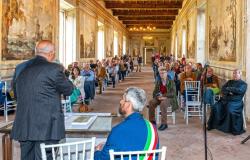“When the Jasmine Revolution, I had graduated about a year ago and was starting to take my first steps in the journalistic profession. I observed the images of Tunisian boys fighting and in some cases dying in the square and I dreamed of being able to tell their stories, record their voices. Of being there and living that experience of resistance and rebellion firsthand, with them. I can say that the beginning of the Arab Spring was the element that definitively marked my approach to the world of journalism, the fuse of my unequivocal passion for the profession of reporter”.
Sara Giudice, Milanese, born in 1986, says this about his book Polveriera Tunisia. Chronicles of a collapsing country, just released by Rizzoli. An essay that is nothing more than an old-fashioned reportage by going to places, meeting people, finding news and making the protagonists say what no one else had managed to bring out. Giudice got his start in American television Class Cnbc and wrote for national newspapers and magazines. From 2015 to La7 and? sent by A clean sweep. He has carried out investigations and reports. For his story on the Balkan route and the journey of migrants he won the international Marco Luchetta prize. In 2022 he wrote for Rizzoli, with Vera Politkovskaja, A motherdedicated to the figure of Anna Politkovskaya.
Now, after having faced the cynical cold of Putin’s Russia, he descends into an increasingly incandescent Mediterranean. A land ready to explode a few miles from the Sicilian coasts. A reportage which, retracing the last ten years of a fragile and unstable democracy, documents in the field the tensions that threaten to have direct repercussions on European countries, first and foremost Italy.
After lighting the fuse of the Arab Spring, Tunisia and? was the only nation in North Africa and the Middle East to start a process of democratic transition. Ten years after the Constitution adopted after the ouster of Ben Ali?, that already fragile and tiring process, aggravated by the economic crisis, galloping inflation, and the increasingly massive influx of sub-Saharan Africans, has undergone a heavy regression. Sara Giudice guides us in a country that today is in chaos even in its most fundamental daily actions such as guaranteeing basic necessities, crushed by the crisis, inflamed by protests, embittered by racism towards sub-Saharan migrants, increasingly seduced by Islamist temptations.
“I tiptoed in to talk about Tunisia, for a year I went up and down from Rome to Tunis and I was lucky enough to meet many people who helped me understand the most important thing I feel like saying: the Tunisia can never really be fully understood, every time I was sure or almost certain of having grasped a dynamic, something happened that contradicted or in any case broadened the horizon and inevitably made it more complex” explains the author.
“Seeing a country full of incredible resources and just twelve million people sink into poverty without a plan for the future is painful and sobering. On the table of the future there are many words, Marshall development plans and infinite promises. The reality, however, unfortunately is made up of stranded prefectures and very long bureaucracies for those who would like to come to Italy or Europe with a regular residence permit. I apologize if inevitably, in my book, some important passages in the history of this country have been omitted: the choice was to privilege individual stories and individual lives, to bring them out of the shadow, trying, through their voices, to understand Tunisia and its people”.
The book
Powder magazine Tunisia. Chronicles of a country in collapse
by Sara Giudice
Rizzoli, pages. 240, 19 euros
Tags: Tunisia powder keg Sara Giudices bookreportage






